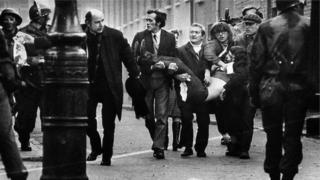Bloody Sunday: Soldier N's solicitor says he has died

Prosecutors considering bringing charges against former paratroopers over Bloody Sunday have been told one of the soldiers has died.
A solicitor for the soldier, known as Soldier N, last week informed prosecutors in Northern Ireland of his death.
Thirteen people were shot dead when members of the Army's Parachute Regiment opened fire on civil rights demonstrators in Londonderry in 1972.
A fourteenth person died later.
In an email received by some of the Bloody Sunday relatives, which the BBC has seen, the Public Prosecution Service (PPS) said: "We received word last week from Soldier N's solicitor that Soldier N had recently died.
"We don't have any reason to doubt the information we've been given but I had directed the police to get some formal proof of that (a death certificate) and was waiting on that before alerting the families."
Eighteen ex-paratroopers have been reported to the PPS over the killings and the Bloody Sunday victims are currently waiting to hear if any will face charges.
A decision over whether to charge soldiers is expected at the end of February.
A spokesperson for the Ministry of Defence said: "We don't comment on individual cases".
Investigation
There have been a number of investigations into the events of Bloody Sunday, including the Widgery Tribunal - which was later described by some as a whitewash - and the Saville Inquiry, which in 2010 led to then Prime Minister David Cameron apologising to the Bloody Sunday families.
The Police Service of Northern Ireland (PSNI) began a murder investigation after the Saville Report on the killings in 2010 said that those who were killed or injured on Bloody Sunday were innocent.
The BBC previously obtained a letter from a senior public prosecutor detailing the criminal charges the soldiers could face.
They include murder and attempted murder, wounding, perjury and joint enterprise, which means an offence where two or more people are involved.
The correspondence stated:
- Two soldiers were reported to the PPS for the shooting of Damien Donaghy and John Johnston, the last person to die
- Four soldiers were reported for the killing of six people; also reported over the wounding of seven people
- Three different soldiers were reported over the killings of four other people
- A further three soldiers were reported over the killing of Kevin McElhinney
- An additional seven soldiers - one of whom had since died at the time the BBC obtained the correspondence - were reported over the killing of John Duddy and the shooting of Margaret Deery, Michael Bridge, Michael Bradley, Patrick McDaid, Patrick Brolly and Pius McCarron
- One soldier was reported for the killing of Hugh Gilmour and another soldier for the killing of Kevin McElhinney
- The four soldiers who were dead at the time the BBC obtained the correspondence were reported for the killing of nine people